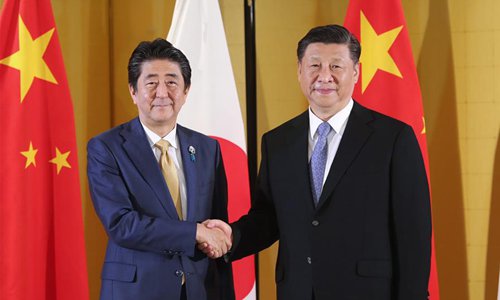HOME >> OPINION
China, Japan share preference for free trade
By Li Ruoyu Source:Global Times Published: 2019/6/30 17:58:40

File Photo: Xinhua
Chinese President Xi Jinping attended the G20 summit in Osaka, Japan over the weekend, a decade after he visited the country in 2009 when he was vice president. With the reins of power changing hands in Japan and the country undergoing different policy changes, the past 10 years have been relatively difficult for China-Japan ties.
Shinzo Abe has been one of the longest serving Japanese prime ministers. Japan's China policy has thus gradually returned to the way the Liberal Democratic Party chooses to deal with Beijing. But due to Japan's previous China policy, the negative impact of Tokyo's misinterpretation of bilateral relations still remains apparent.
An impression can thus be easily created - Abe lacks sincerity in improving bilateral relations. But the reality is more complicated.
Xi once said about China-US ties, "there are a thousand reasons to make the US-China relationship a success, and not a single reason to break it." Since Japan is a neighbor of China that cannot move away, Abe also has a thousand reasons to make the China-Japan relationship a success.
Abe's China policy is first and foremost dictated by the needs of Japan's domestic politics. That being said, his decisions will not always be good for Beijing-Tokyo relations. But China's peaceful rise is irreversible. Therefore, Abe is putting in more efforts to improve ties with China. This is reflected in his persistent efforts to invite the Chinese leader to Japan.
However, Abe is not a pro-China politician. His zeal to invite Chinese leaders to visit Japan is ultimately driven by Japan's self-interest.
As the host country of the 14th G20 Leaders' Summit, Japan called for maintaining the free trade system. At a press conference following the summit on June 29, Abe stressed again that "the G20 agreed on fundamental principles backing a free trade system." This underscores Abe's preference for the principles of free trade.
The China-US trade dispute shows how strong a proponent of free trade China is. China has always stuck to this stand in trade talks with the US. Xi reiterated China's position of strengthening cooperation and upholding multilateralism on several occasions during the G20 summit.
Japan is an island country and realizes the significance of international economic and trade cooperation. Moreover, protectionism has brought keenly felt pain to Japan, not to mention the Plaza Accord in 1985, which is considered the direct cause of Japan's economic ruin. Currently, whether the US will begin a Section 301 investigation into Japan's automobile export to the US depends on their future trade negotiations.
Even so, constrained by its military alliance with the US, Japan is still avoiding the crucial issue of who caused the free trade crisis in the first place when trumpeting the importance of free trade principles. Although Tokyo has never mentioned it explicitly, it has been taken on by the US from time to time.
Just ahead of the G20 summit, it was reported that US President Donald Trump is not satisfied with the Treaty of Mutual Cooperation and Security between the US and Japan and is considering to pull out of it, which made the Japanese government uneasy in the run up to the Osaka summit.
China's defense of free trade principles at the summit prompted Japanese politicians, such as Chief Cabinet Secretary Yoshihide Suga, to speak highly of Xi's visit, because Tokyo and Beijing are on the same page over the contribution of free trade to promoting bilateral relations.
The year 2019 marks the 70th anniversary of the founding of the People's Republic of China. Beijing-Tokyo ties are poised for a new decade.
President Xi is planning a state visit to Japan in the spring of 2020 under the invitation of Abe. Bilateral relations are likely to see an upswing in the near future.
Whether to focus on openness to create more space for development or follow unilateralism against the objective law of human history affects not only China and Japan, but also global development. If Japan hopes to be a responsible regional power, it must make the right choice.
The author is an associate professor at the School of History & Cultures, Sichuan University. opinion@globaltimes.com.cn
Posted in: ASIAN REVIEW